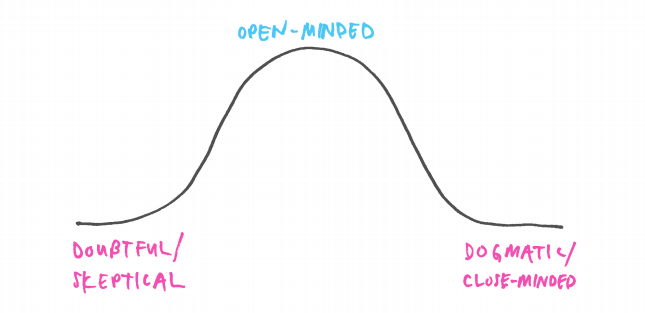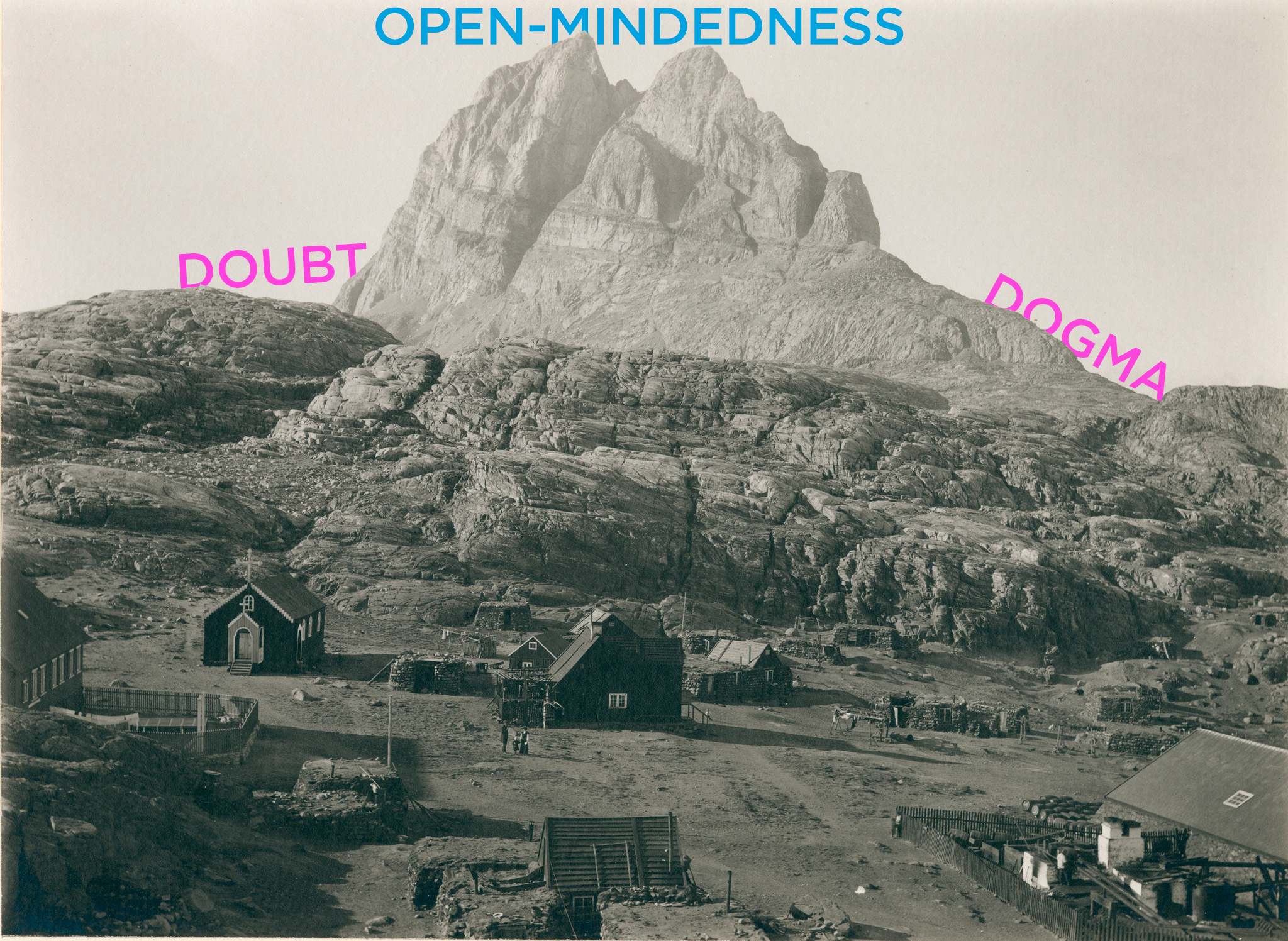The pursuit of knowledge is a tricky thing. On the one hand, when we discover truth—whether concerning an issue in science, history, theology, or any other subject matter—we should maintain a conviction about it, holding on to our belief with a certain amount of firmness. After all, knowledge is valuable and precious—sometimes even life-saving. In fact, when it comes to moral insight or what Scripture calls wisdom, a biblical proverb says we should be prepared to sacrifice all we own in order to attain it (Pr. 4:7).
On the other hand, the pursuit of knowledge requires a teachable spirit and a willingness to recognize one’s intellectual fallibility on all sorts of issues. We all make mistakes in the intellectual realm, so it is possible that we have erred even regarding beliefs about which we feel most confident. Where we have the strongest convictions we might in fact be entirely ignorant!
So how does one deal with this tension between the need for conviction and the fact of human fallibility? How do we avoid the vicious extremes of closed-minded dogmatism and total skepticism? The answer, it seems to me, lies in open-mindedness, which is generally regarded as a key intellectual virtue.
William Hare, a philosopher of education, defines open-mindedness as “a readiness to consider new ideas together with a commitment to accept only those that pass scrutiny.” So understood, open-mindedness is a midpoint between two intellectual vices, a sort of apex between the valleys of dogma and doubt.


Open-mindedness seems to be an especially important virtue at this time in history as we witness the vicious extremes of dogmatism (e.g., political correctness and Muslim extremism) as well as skepticism (e.g., postmodern doubts about all absolute truth claims). Both tendencies are inimical to the flourishing of a community generally and to Christian practice in particular.
Reasons to Be Open-Minded
So let’s consider some of the benefits of this virtue, why we should strive to be open-minded.
1. Open-mindedness has significant practical benefits.
Every human community depends upon the acquisition of knowledge. And if human understanding in any field is to advance, then there must be a sincere quest for new perspectives and ways of conceiving things. Otherwise, we’ll stagnate in our current conceptions, never growing or developing. Every tool and appliance you use throughout the day was the result of someone’s innovation, as they scrapped established categories to create something new, from the air conditioner to cell phones.
2. Open-mindedness contributes to social unity.
Those who are willing to consider alternative viewpoints tend to be more patient and less reactionary. So this virtue tempers reactions to views one rejects. Imagine the millions of lives that would have been spared in just the past few generations if some political and religious dogmatists had been more open to alternative perspectives.
3. Open-mindedness is crucial for art and aesthetics.
It is the essence of artistic creativity to be willing to challenge or transcend current trends and designs, to forge new and unique forms of beauty. Even those of us who are not songwriters, visual artists, novelists, or filmmakers are enriched by the work of such people. All cultures and human communities are richer for the arts, and the success of these pursuits depends upon open-minded exploration.
4. Open-mindedness is also critical in the moral life.
When it comes to moral-spiritual formation, a readiness to change is crucial. And moral change takes at least two forms: (1) altering one’s behavior to conform to a standard one already accepts and (2) changing one’s view about certain aspects of the moral standard itself. The former demands self-control, while the latter requires an open mind as well. So I may be completely willing to live with integrity, but if I don’t believe, for example, that music piracy is morally wrong, then I won’t display integrity in that area of my life. And if my mind is closed to the possibility that such behavior is wrong, then I’ll remain stuck in that sin. In such cases, repentance and spiritual growth depend upon open-mindedness.
5. Lastly, we should strive to be open-minded because this fulfills the Golden Rule.
Ask yourself this question: When engaged with others with whom I disagree about important issues, do I want them to seriously consider my point of view? Do I want them to be sincerely open to the possibility that my perspective is correct or at least more correct than their perspective? Of course, we all want this. In fact, we are peeved by those who aren’t so open, who show no inclination to consider alternative views. So, given the Golden Rule, we should likewise be open to considering other perspectives.
But this raises a serious question.
Does Open-Mindedness Apply Equally to All Beliefs?
Does the virtue of open-mindedness call for equal treatment of all alternative beliefs, regardless of subject or context? Must I be as open to diverse beliefs about, say, God and basic morality as I am open to alternative views on climate change and economic theory?
Surely not.
In fact, to be equally open-minded about all things would be unhealthy, if not psychologically impossible. Imagine being open to the idea that the person you believe to be your mother has really been an imposter all these years. Or even that perhaps you are really sleeping and dreaming right now rather than reading these words on a screen or paper in front of you.
So clearly there are proper limits to open-mindedness.
One might say that this virtue is context-dependent, such that it is virtuous to be open to, say, new political theories but intellectually vicious to be open to tyranny or the view that the government should execute atheists or polygamists.
Or, when it comes to theology, we might say that one may be appropriately foreclosed about the existence of God but one should be open to considering various claims about how other people experience God.
Which Theological Beliefs Are Open to Question?
Furthermore, we may ask, as a Christian, which of my theological beliefs are properly open to question and which ones am I warranted in being dogmatic about? One approach with which I am sympathetic would be to use Church tradition and the classic Christian creeds as guideposts when answering this question.
Thus, belief in the Triune God and the bodily resurrection of Jesus are non-negotiable, while one’s views on baptism, the millennium, or the Calvinist-Arminian debate (while important) should be open for challenge. Relatively firm convictions on these issues may be appropriate, but one ought not be completely foreclosed against alternative perspectives. (At least this way of approaching it makes sense to me. I could be wrong, and am open to considering an alternative approach!)
There is plenty to debate here, of course, regarding what sorts of issues are properly up for debate, and how open we should be to open-mindedness in various areas.
But hopefully we can agree as Christians that wherever we are dogmatic in terms of belief, we should nevertheless display charity and grace in how we hold our beliefs. Even where we disagree about fundamental issues pertaining to God and moral conduct, we should be kind, patient, and civil in our interactions with others. Perhaps here, regarding the mandate to display the Christian virtues (or “fruit of the Spirit” —cf. Gal. 5:22), we can be dogmatically foreclosed as well.
How to Become More Open-Minded
So, assuming open-mindedness is a good trait to have, how does one develop it?
The first thing to know is that it takes practice.
As Aristotle and other virtue ethicists have noted, virtue takes practice. To develop certain traits, one must behave accordingly. In the context of open-mindedness, this means intentionally exposing oneself to alternative ideas, especially in reading and conversation. It means being willing to discuss and interact with others about important issues, even where one strongly disagrees and doesn’t ever expect to change one’s mind. And, in the context of such discussion, it means really listening—listening more than talking and even allowing the other person to have the last word.
Secondly, keep in mind that open-mindedness is vitally connected to other intellectual virtues.
These include intellectual humility, courage, and carefulness. Humility is especially crucial for open-mindedness. The intellectually humble person is mindful of her own fallibility, recognizes and reminds herself of the intellectual errors she has made in the past (think of the silly things you once believed!) and reflects upon the benefits that resulted from changing her mind about certain issues. She also will consider the facts that (1) at least some of the views she now holds are false (given the huge number of beliefs one holds, to think otherwise would be extreme arrogance, if not self-idolatry), and (2) it is not clear which of one’s beliefs are the false ones. So the rational thing to do is to loosen one’s grip on most of one’s beliefs, at least to the point that one is willing to seriously considers other points of view.
